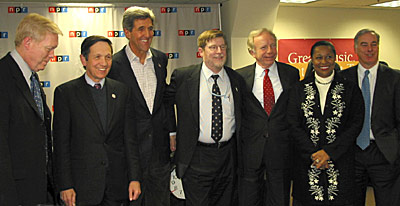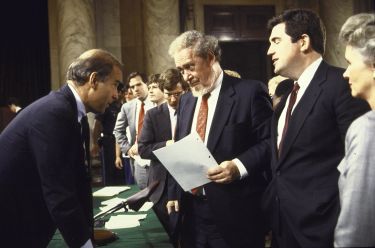“Root-causeism” and electability
From The New CriterionThe cliché of this primary season — and, like most clichés, it’s probably true — is that the Democrats are fired up with hatred for and resentment against President Bush this election year. Or, in the jargon of the political professionals that is more and more to be found in ordinary news reports, the “base” is unusually “motivated” to work for the President’s defeat. In fact, saying that the Democratic base is motivated has become a way of getting the base motivated. Exit polls from almost every primary election in February and March tell us that the prime consideration among the Democratic voters who chose John Kerry to be their standard bearer was that he was the candidate most likely to beat Bush in November. What Marjorie Williams of the Washington Post, a Kerry supporter, calls the “alarmingly tautological nature of John Kerry’s victory” turns out to be an example of what Andrew Ferguson in The Weekly Standard called “the po-mo primary” in which “everybody was thinking like a pundit, especially voters.” In citing his “electability,” the Kerry voters “voted for someone because they thought voters would vote for him. It is second-order reasoning, a meta-rationale, a judgment about a judgment about a judgment. It will make your head hurt if you think about it too long.”
Like the priesthood of all believers, the pundit-class of all voters is in one way a democratizing force. It owes a lot to the blogosphere and can hardly be a bad thing if it cuts into the monopoly exercised by media punditry as it is currently practised. Yet that which above all else makes the quality of most commentary by newspaper and magazine columnists so poor is equally debilitating to the wit and the independence of the unpaid bloggers, and that is cheap sophistication. This is everywhere in the media today, both commercial and amateur, and is, I take it, what’s really behind Mr Ferguson’s po-mo primaries. For to say that you’re voting for someone because you think he’s more electable is really to engage in a form of posturing. You assert what can only be a false sense of your own importance by affecting an attitude of power, like that of a party boss or kingmaker, or of knowledge, like that of a handler or a spin-doctor. How do you know that Mr Kerry is more electable than Mr Edwards or Mr Dean? The answer is that you don’t. But you’ve heard some media wise-man say so and it flatters you to associate yourself with someone who is paid to make such predictions — presumably on the basis of deep knowledge.
Of course it can never be anything more than an affectation. It is natural enough for the party bosses and the electoral technicians to think in this way about electability because they have a direct interest in acquiring power. It may be cynical but at least it makes sense to conclude that they have no policy but being returned to power, no interest in any candidate but the one most likely to effect that return. When Evelyn Waugh said that modern politicians did not seek power in order to implement policies but sought policies in order to attain power he at least proposed a rational if vicious state of mind on the part of those for whom power meant, if nothing else, the power of patronage. But what do ordinary Democratic voters stand to gain from adopting such an attitude — apart from the fact that it makes them feel wiser than they are, part of the circle of the initiate who know that this is the way the world really works? You’d think they’d feel ashamed to adopt such a cynical pose for such a small return. But then if there is no difference to speak of between the candidates and no return at all for paying close attention to their policy positions, you can begin to understand why they care so much about putting their man in power and so relatively little about what he may do when he gets there.
At any rate, for such people hatred of George W. Bush seems to have become its own justification. Some such reflection must have occurred to the British sociologist Frank Furedi when his eight-year-old son came home from school one day recently and said, “Daddy, I really hate Bush.” When asked why he hated the American president, about whom he knew no more than most other British eight-year-olds, the boy replied, “Because he’s so stupid.” Obviously, the child had no first hand evidence for this assertion, but he was clever enough to spot it for what it was: an expression of kind of tribal loyalty. Others that he admires and looks up to believe this, so he is happy to sign on to the belief himself. He has joined the club of the Bush-haters — who, he is probably old enough to realize, include most of the entertainment industry and others in the public eye whom his slightly older contemporaries regard as “cool.”
And of course that kind of tribalism is exactly how politics in the entertainment industry works too. The anti-war activist and movie actor, Sean Penn, was apparently aware of no irony when he accepted this year’s Academy Award for Best Actor by saying: “If there is one thing actors know — besides that there were no WMDs — there is no such thing as ‘best’ in acting.” Could he really have been saying that all you needed to grasp what had escaped the attention of every intelligence service in the Western World, to say nothing of the United Nations, was to be an actor? I don’t think that even an actor could have been quite as arrogant and stupid as that. What he really meant was more or less what Professor Furedi’s son meant: namely, that all the cool people (like himself, by the way) hate Bush.
In Furedi’s view, in an article written for www.spiked-online.com, his son’s easily adopted hatred of Bush was a minor illustration of the larger social fact “that how you feel, rather than what you believe in, has become the defining feature of political protest.” Clearly, he has a point there. The anti-globalization protestors, for instance, have no clearly-defined program of action but only a vague sense of resentment against large corporations and government-sponsored agencies such as the IMF. But Furedi’s interest is more in the protests against the war, especially those held in Britain, which were of a similar nature and pointed to the extent to which, he says, “protest has become a strikingly personal matter. It is about the protester as an individual, and says more about how he feels about himself than what he thinks of the issue at stake.” Consequently, “it is difficult to define today’s acts of protest as constituting a political movement. On the contrary: they are the product of a profound mood of political disengagement that afflicts most Western societies.”
This mood of disengagement is not a political program or policy, but something more like an irritable gesture motivated by “cynicism, passivity and a sense of fatalism” against the idea of being included in someone else’s program of action. Hence the ubiquitous slogan of the British war-protestors, “Not in my name.”
‘Not in my name’ [writes Furedi] is self-consciously framed as a personal proclamation. It is not a political statement designed to involve others, and does not seek to offer an alternative. It does not call on anyone to choose sides or even insist on a particular course of action. Insofar as it represents an attitude, ‘Not in my name’ is a statement of individual preference and represents an opt-out clause, rather than an attempt to alter the course of events. This is a shrug of the shoulder, which reflects a mood of general anti-engagement as much as it does a weariness towards war.
Indeed, Furedi goes so far as to conclude that “the personal presentation of anti-war sentiment contains an implicit renunciation of social activism and protest.”
For such people, John Kerry is a natural, perhaps an inevitable candidate. He, too, says “Not in my name.” He has no policy on terrorism save loud and repeated insistence that the Bush policy is wrong. When asked what he would do instead, he replies in essence that he would pretend that the events of September 11th, 2001 never happened. Apart from some sort of expeditionary force to find and punish Osama bin Laden, he proposes that it is possible to stand down the military participation in the “war on terror” — with all that that suggests of the fears of another Vietnam which have haunted Kerry since he first came to national prominence 33 years ago as a spokesman for Vietnam Veterans Against the War — and go back to the pre-9/11 treatment of terrorism as a matter for the police. Like Howard Dean before him, he appeals to those whose sense of resentment is directed not at terrorists but at Bush and his allies for their unwelcome insistence that terrorism must be opposed militarily.
And here again, the problem of cheap sophistication rears its painted head. For the Democratic constituency — at least at its top, New York Times-reading, latté-drinking, NPR- listening end — is largely composed of the “root causes” school of politics. These are people who consider it a proof of intelligence to treat as axiomatic the proposition that the real causes of all social evils, from drunkenness to murder to obesity, lie not with the behavior of the drunks, murderers or obese people but in poverty, ignorance, large corporations or George W. Bush. As it happens, last month the House of Representatives passed the hilariously named Persosnal Responsibility in Food Consumption Act, also known as the “cheeseburger bill,” over substantial Democratic opposition, to grant immunity from liability to the fast food industry in the case of litigants seeking damages against it for having made them fat. “The food industry is under attack and in the cross hairs of the same trial lawyers who went after big tobacco,” said the bill’s sponsor. Stiff opposition was expected from Democratic heavyweights when it went to the Senate.
I have no space here to go into the question of the validity of root-causeism in all its various forms, but one thing should be perfectly obvious: it is the appeal of root-causeism to those whose sense of self is bound up with presenting themselves as being cleverer than their neighbors. Let’s say, for example, those who vote on the basis of “electability.” In the “Notes & Comments” section of last month’s issue of The New Criterion, Professor Robert Brandon of the philosophy department of Duke University — and what could be cleverer than that? — was quoted as justifying his own, non-conservative views by asserting that John Stuart Mill (you may have heard of him) said that stupid people were mostly conservative. Of course, as our diarist pointed out, Mill never said anything so preposterous. But the professor of philosophy made the easy assumption of the would-be sophisticate that something Mill did say — namely that the 19th century British Conservative party was, compared with the 19th century Liberal party, “the stupid party” — amounted to the same thing.
For such people, root-causeism is a natural corollary of their own self-conceit as smarter than those they disagree with. Does one deal with crime by putting criminals in jail? Perish the thought! One deals with the root causes of crime by eradicating poverty and injustice so that there will be no more criminals. So it is too with terrorism. Once you get used to the idea that the root causes of terrorism are anything but terrorists who knows where it will end? In a column in the Washington Post, for example, in which he took the Bush administration to task (yet again) for failing to prevent the 9/11 terror attacks, Richard Cohen recently wrote that, at the changeover between the Clinton and Bush administrations,
Sandy Berger, the national security adviser under Bill Clinton, had told Condi Rice, the national security adviser under George W. Bush, that terrorism would be her No. 1 concern — and yet almost 3,000 lives were lost and a gash punched into the Pentagon and a hole left in the bottom of Manhattan Island. For this, somehow, no one is at fault. [Emphasis added]
So natural is it for Cohen to think, insofar as you can call it thought, like other sophisticates in terms of root causes that he seems to have forgotten that it is even possible to think any other way. Or perhaps he considers himself such a sophisticate that he will not even deign to notice that the base vulgar in their primitive, Neanderthal way continue to suppose that it was the terrorist hijackers who were at fault. Oh, please! You’d have to be as stupid as George W. Bush to blame the actual terrorists for terrorism. If it were as simple as that, the whole of the punditocracy would be out of work and Democratic voters would have no one’s example to look to as a guide in seeking out their most electable candidate.
Nor is it quite coincidental that electability for Democrats seems to depend on an often subtle but always firm endorsement of root-causeism, at least when it comes to terrorism. Joe Lieberman, the only candidate who was in favor of treating terrorists as a military threat to this country and not as a manifestation of failures by the Bush administration, never got more than about ten per cent of the vote. And behind the rejection by John Kerry and the other candidates of most military options for dealing with the terrorist threat there lies the seductive Siren-song of root causeism: if we’re nice to the terrorists and show them we understand the reasons for their “anger” they’ll leave us alone. The real fault-line in American politics lies between these sophisticates and root-causers who propose what is essentially a therapeutic model of international relations and the almost entirely inarticulate party of those who cling to an old-fashioned notion of honor among nations, namely that if one is hit one must hit back, or one will continue to be hit until one does.
On this, admittedly outmoded view, it’s not even that important whom you hit. This, I believe, is what lies behind those stubborn majorities who keep insisting to pollsters that there is a connection between al-Qaeda and Saddam Hussein. That, too, has a root cause in the view of the root-causers: namely the “lies” of the Bush administration — the root cause, after all, of most of the evils in the world. But what if such people mean something quite different from what is supposed? What if they don’t care whether or not Saddam was in cahoots with the guys who knocked down the twin towers but remain firmly persuaded of another kind of “connection” between them — namely that if Saddam is whacked for 9/11, whether or not he had anything to do with it, it will give those who did have something to do with it something to think about? This may be how the “stupid party” thinks, but that in itself doesn’t mean that it isn’t a more effective way of dealing with terrorism than the smart people’s solution of tightening up security even further and hoping that it will go away.
Unfortunately, there is a European version of root-causeism which strikes me as being a bit more plausible than the home-grown variety — and the results of the Spanish elections last month seem to suggest that it has the power to sweep all before it in a whole continent full of sophisticates. The terrorist outrage, seemingly by al-Qaeda, in Madrid only three days before the election seems to have resulted in an electoral thrashing for the pro-American, pro-invasion of Iraq Popular Party because most Spaniards take John Kerry’s view that American military intervention against terrorism is the root cause of terrorism. And even if it isn’t, the safest course for Spain if she wants to get out of the line of terrorist fire is to disentangle herself from the U.S.-led anti-terrorism alliance. This last calculation is probably true too, at least in the short term — though that can hardly be much source of satisfaction to Kerry, whose answer to every question about terrorism involves increased international cooperation.
There is a certain irony, then, in Kerry’s saying that “I’ve met with foreign leaders who can’t go out and say this publicly. But, boy, they look at you and say: ‘You’ve got to win this. You’ve got to beat this guy. We need a new policy.’ Things like that.” The Wall Street Journal and others have heaped scorn upon this claim, but I see no reason to doubt it. Certainly, it is beyond question that President Bush is not a popular figure anywhere in Europe. Yet if the sophisticated Europeans are whispering in the ear of Bush’s rival, urging him to be as sophisticated as they — for which urging indeed there seems to be but little necessity — in discovering that the root causes of terrorism lie in President Bush’s over-enthusiastic war on terrorism, it doesn’t take any remarkable degree of brain-power to see what’s in it for them. From their point of view, appeasing the terrorists might make sense, since it is not unreasonable to suppose that doing so will merely result in the terrorists’ re-directing their energies towards specifically American targets. For Kerry, however, to present to the American people their disingenuous desire for “a new policy” as a reason for voting for him is astonishing. He must think we’re stupid.
Discover more from James Bowman
Subscribe to get the latest posts to your email.







